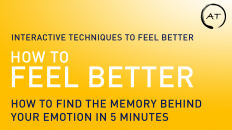When people first begin working on their emotions, the most common questions they ask me is, “What do I do if I can’t find the memory?”
Fear not. I have many ways around this problem.
Normally, one of two things is going on:
- The person isn’t trusting their mind
- The memory is hard to find or too intense to look into
I just want to reiterate that your mind is a web of connections. Your mind may bring what seems like a random memory up when you focus on an emotion. But the connection is still there. Just let your mind do its thing and trust it. Finding the memory isn’t a logical or methodical conclusion for you to work out, you just need to follow the strings in your mind.
When the memory really escapes you, I recommend just feeling the emotion.
How do you do that?
- Focus on the emotion. Amplify it. Feel it deeply.
- Continue concentrating on the emotion and how it manifests in your body.
- Feel any resistances to the emotion. Fully accept the emotion.
- Eventually, the emotion may lessen or resolve itself.
When you first experience an emotion resolving itself, it’s magical. It’s the pure feeling of catharsis. You’ll instantly feel lighter and happier.
Afterwards, when you reflect on what just happened, you’ll begin to wonder how the emotion just disappeared.
There are several reasons why just feeling the emotion works.
The first is that your mind is doing the work for you. Even in the background, your mind can look at its connections and the memory behind the emotion. Because you have more information and a better understanding of the world now than when the emotion formed, your mind can correct inaccurate assumptions and reprocess the emotion.
The other aspect of the sudden emotional releases comes back to the fact that each emotion has a purpose. When an emotion’s purpose is fulfilled, the emotion no longer needs to grab your attention. Basically, by feeling your emotion deeply, you are listening to your emotion. When the emotion feels that you have listened to it and it has communicated what it needs to, the emotion’s purpose has been fulfilled. The emotion is completed and releases,
Another really good technique for when you cannot find the memory behind an emotion is writing about the emotion. More on that in another post.


